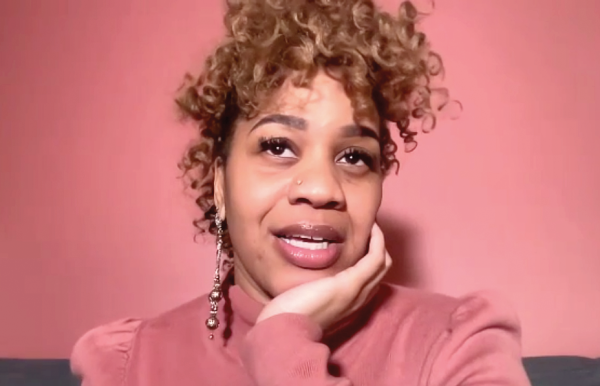February 15, 2023

Sheena Collier, CEO and founder of Boston While Black, was the key speaker at the February Greater Mattapan Neighborhood Council (GMNC) meeting.
Sheena Collier started out as a Boston Public Schools educator in Dorchester. Now, as CEO and founder of Boston While Black and the Collier Connection, she is focused on removing obstacles that Black Bostonians face when trying to connect to the city around them.
“I was seeing all these talented people, particularly Black professionals, come here [for school] and then they would leave because they didn’t feel they can connect to what’s going on here,” Collier said during a Feb. 6 appearance in front of the Greater Mattapan Neighborhood Council. “I wanted to see how I could help slow the issue of people coming here and not connecting to the community.”
Collier went from being a BPS educator to an officer in the Greater Boston Chamber of Commerce to a nonprofit worker in Uphams Corner before becoming an entrepreneur focused on elevating Black professionals at Boston While Black while connecting them to each other and the city they live in.
Collier said she came to Boston after growing up in Albany to get an advanced degree in education at Harvard University. But at Harvard, she said, she was turned off by certain things, such as being advised not to take the Red Line to Dorchester and talk of “Murder-pan,” and how Black children in the education sector were always seen as “resilient” or “gritty.”
“Often when people, white people in particular, in education are talking about Black and brown children they use the word ‘resilient’ a lot and it’s about saying what a great job they’ve done withstanding bad conditions, instead of looking to improve those conditions,” said Collier.
“I had a hard time with that…We are a resilient people, but we should be able to talk about it from a place of strength.”
Collier spent more than a decade in BPS, mostly at Dorchester’s Winthrop School. Being there, she said, helped her connect to Boston and its communities of color much easier than other Boston transplants. It was also an experience that stirred in her the beginnings of Boston While Black along with the fact that 33 of her 35 Black Harvard classmates left Boston.
Tired of education, she made a sudden decision to see corporate Boston through the lens of a job at the Greater Boston Chamber of Commerce while also working at the Big Sister Association of Greater Boston and the Dudley Street Neighborhood Initiative (DSNI) in Uphams Corner.
Boston While Black and the Collier Connection came out of those experiences, she said, out of a desire to solve the issue of Black people in Boston – in places like Mattapan and Dorchester – not having a sense of belonging. Boston While Black is a membership organization that looks to connect professionals and uplift the stories and culture of Boston’s Black communities, while also supporting Black businesses in Black communities. Mattapan looms large on that list, as it is a pocket of Boston with a high number of Black homeowners. Many students and transplants coming here often don’t know Black communities like Mattapan exist, she said.
“I wanted to figure out how to bridge the gap to this group because Boston is a beautiful city that has a lot of resources,” she said. “It’s on the water and has great restaurants and amenities, but so many people don’t experience it that way.”
She said the goal for the organization is to get deeply embedded in Dorchester, Roxbury, and Mattapan so that they can move from “surviving to thriving.”
The message resonated with Councillor At-Large Julia Mejia, who said, “I’m tired of talking about our deficits and not our assets.”
But while Boston While Black has traditionally focused on transplants to the city, lifelong Mattapan residents said they also feel disconnected – particularly since establishments for young people to socialize have disappeared.
“We have to open our minds whether young or old,” said Kenya Beaman, who noted the city struggles to keep Black professionals. “I don’t want to travel to Atlanta to experience real Black culture…I want to experience that [in Mattapan] where I pay a mortgage. It doesn’t have to be a club.”
Collier said it’s a matter of valuing Black spending. “I don’t think D.C. is less racist, I think they just recognize Black dollars,” she said. “That doesn’t happen in Boston because so much is viewed through a lens of disparity…People in the South aren’t less racist; they just understand Black people have money and they will spend it.”
MATTAPAN NOTEBOOK
• ISD says they need to do a better job managing properties – Dion Irish, chief of operations for the city, appeared at the Feb. 6 GMNC meeting and said the city needs to do a better job maintaining facilities in Mattapan and citywide – and they’re developing systems to better track and make repairs to facilities like the Mildred Avenue Community Center and other Boston Center for Youth and Families (BCYF) facilities. “If you have a gym and it cannot be used,” he said, “what’s the purpose of that facility?”

Dion Irish, the city’s chief of operations, said the city hasn’t done a good job of maintaining facilities, but is on the path to correct that long-standing problem.
Screen Shot
Irish took questions from the GMNC attendees and was barraged with important and long-standing questions about inferior construction and repairs to the Mildred Avenue Community Center and the long delays at the Mattahunt BCYF center. Resident Gina Pitts said the gym at the Mattahunt has been out of commission for more than three years, while resident Barbara Crichlow said promised renovations there are still outstanding five years later.
Irish said that and part of his job now, at the direction of Mayor Michelle Wu, is to move to a place of managing facilities proactively instead of when they deteriorate and have to close. He noted his initial study of the BCYF issues showed only three people were funded to take care of maintenance across the city.
“We found we have a problem we need to fix and it’s a problem we’ve had a long time,” he said. “When you’re understaffed, you’re just putting a Band-Aid on things and not really fixing them. This is not a path we want to continue on.”
He said they are excited to build new facilities, like community centers and schools, but they need to figure out how to better maintain existing facilities first.
That is an effort, he told Mattapan residents, of high priority right now.
Incidentally, Irish noted that his family came to Boston in the 1980s and he grew up in Mattapan, and his mother and sister still live in the neighborhood. He attended Dorchester High School and went on to Boston University. He has worked for 28 years in various roles for the city. Now, he is a cabinet member overseeing operations like Inspection Services Department (ISD), Property Management, and Public Facilities. He has also been tapped to lead the city’s efforts in the Green New Deal for BPS.
•The GMNC is in the process of spreading out the duties internally, Chair Fatima Ali Salaam said. As a result, each committee will have two co-chairs moving forward, and the moderator of the monthly meetings will change up. This month, Board member Chad Fletcher led the charge in co-hosting the meeting with Ali Salaam and collected strong reviews.
•The GMNC Zoning Committee approved three development proposals from DVM Consulting – city-owned vacant land developments that are part of the Blue Hill Avenue Action Plan efforts. Dariela Villon-Maga, of Mattapan, is proposing eight units on 1039 Blue Hill Ave./6 Fabyan St., 10 units at 1015-1019 Blue Hill Ave., and 12 units at 1028-1044 Blue Hill Ave. The approval came with stipulations to move unwanted mature trees to other parts of Mattapan, and to get letters of support from abutters.
•The Ryan Playground Wading Pool meetings have begun with the new Task Force appointed by State Rep. Brandy Fluker Oakley. A public meeting is expected in March to present new ideas.
•Two new committees have formed in the GMNC, most interestingly the BPS Committee to look at education issues. The chair of that panel is 17-year-old BPS student Cisco Fernandez, and it’s co-chaired by BPS parent Meshell Whyte. Eight BPS students must be part of the committee for it to function, and the hope is to tackle real issues experienced in the schools by students and parents.
•The Mattapan Community Yard Sale has been solidified for April 22 at the Mildred Avenue School parking lot. Community members are invited to continue the planning process for the sale in the upcoming GMNC Community Services meetings.


